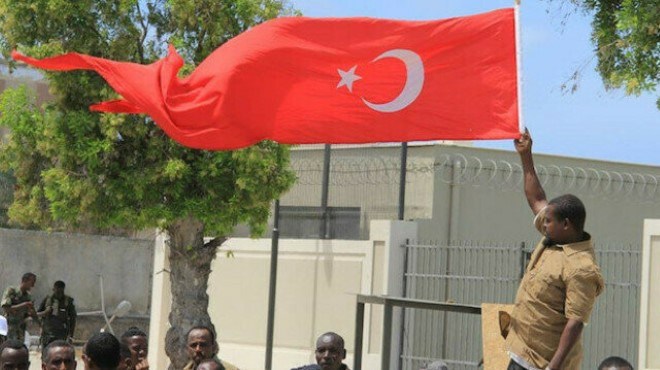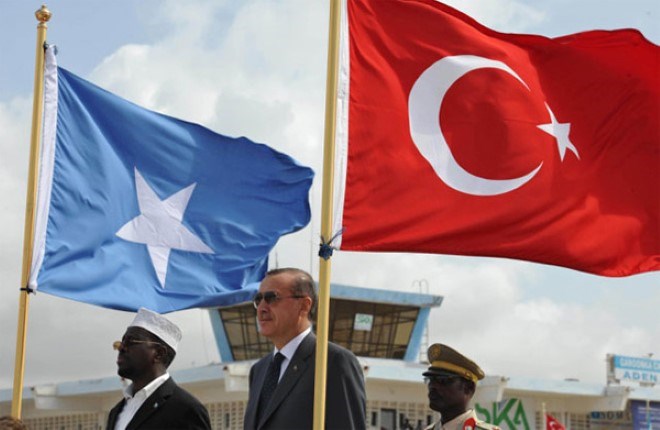Thursday, August 19, 2021
By Ibrahim Mukhtar
Turkey’s growing smart power approach in Somalia significant for both sides
FILE PHOTO
A decade ago, when Turkish President Recep Tayyip Erdogan, then prime minister, set foot in Mogadishu, the most high-profile visit by a non-African leader to Somalia attracted the world’s attention to the dire humanitarian crisis in the country. Turkey’s priority in Somalia was to deliver humanitarian aid to those affected by the drought, the worst in East Africa in 60 years.
A decade ago, when Turkish President Recep Tayyip Erdogan, then prime minister, set foot in Mogadishu, the most high-profile visit by a non-African leader to Somalia attracted the world’s attention to the dire humanitarian crisis in the country. Turkey’s priority in Somalia was to deliver humanitarian aid to those affected by the drought, the worst in East Africa in 60 years.
Turkish governmental and civil society organizations were providing humanitarian and development aid, building schools and providing scholarships to Somali students to study in Turkey. Soon other foreign missions were established, and the city was booming, attracting new businesses and waves of diaspora communities coming back to their home country.
Doors for trade between the two countries were opened. Turkish companies began investing in Somalia, and some of them won lucrative deals to manage Mogadishu’s port and airport. Meanwhile, many Somali entrepreneurs have since opened businesses in Turkey, and hundreds of others have made Turkey their preferred destination for higher education and health tourism.
Turkey’s efforts in Somalia were seen as a success of its soft power approach there. Both Turkey and Somalia reiterated the importance of shared historical and cultural ties in strengthening their relations and pursuing ways of seeking more cooperation in other domains. The Horn of Africa country became Turkey’s gateway to East Africa and the wider sub-Saharan Africa. Aug. 19, 2021, marks the 10th anniversary of the resumption of relations between Turkey and Somalia. These relations, which have been strengthened and developed in various spheres, are poised to grow deeper looking forward.

File Photo
Beyond soft power
A series of developments at the international, regional and local levels have encouraged both countries to widen their relations beyond humanitarian, development, cultural and trade relations.
Following the failed July 15, 2016 coup in Turkey orchestrated by the FETO movement, Turkey sought to cement its presence in the Middle East and Africa, where the terrorist group has been maintaining a strong presence.
Regionally, Turkey was wary of the influence of countries like the United Arab Emirates in advancing anti-Turkish interests. Meanwhile, US support in northern Syria for YPG, which is affiliated with the PKK, a terrorist organization that has been responsible for the deaths of thousands of Turkish citizens since the 1980s, signaled to Turkey that it should be more proactive militarily in the region if it is to secure its national interests.
Encouraged by its military-technological revolution such as the Bayraktar TB2 unmanned combat aerial vehicle (UCAV), Turkey embarked on its hard power approach as seen in Libya, Syria, and Azerbaijan’s Nagorno-Karabakh region.
Keen to secure its strategic interests in Somalia, Turkey built the TURKSOM military academy on the outskirts of Mogadishu to train Somali troops.
Internationally, Turkey saw an opportunity in taking advantage of what it perceives as an emerging multi-polar world order which will allow it as a regional power to flex its muscles and to demonstrate its strategic importance.
For Somalia, securing and liberating the country from the threat posed by al-Shabaab militants as well as protecting its borders has been a top priority for successive governments.
To achieve this, Somalia was in search of a militarily strong ally willing to support it generously. Almost 2,500 Somali soldiers have received training so far at TURKSOM, and Turkey has been generous in donating crucial military equipment to Somalia.
So far, Turkish-trained forces have been at the forefront of the fight against al-Shabaab as part of the Somali National Army (SNA) and have been able to liberate new strategic towns such as Janale in the southeastern Lower Shebelle region of Somalia.
Moreover, al-Shabaab attacks in the capital Mogadishu have declined.
TURKSOM is also important for Somalia as the regional force, the African Union Mission to Somalia (AMISOM), gradually scales down its presence in the country to allow the SNA to take over Somalia’s fight against terrorism.
Former US President Donald Trump’s decision to withdraw approximately 800 US troops from Somalia in December last year also means that Turkey’s role in rebuilding the SNA is urgent and should be accelerated.
Smart power
The aforementioned factors have encouraged Turkey to blend its soft power approach in Somalia and across the region with hard power to secure its national and strategic interests. Joseph Nye, an American political scientist, calls this blending “smart power.”
Turkey’s growing smart power approach in Somalia is significant for both sides. For Turkey, it can become a pivotal player in the Horn of Africa region, secure its long-term strategic interests and widen its presence in sub-Saharan Africa.
For Somalia, an honest and reliable ally like Turkey that is willing to support it during its most difficult times and to generously share its expertise in the military field is an indispensable gain.
Recent developments in Afghanistan should serve as a great lesson for Somalia that international support is unreliable.
The US withdrawal from Afghanistan and the Taliban takeover is a testament to Somalia that it cannot afford to rely on AMISOM or US military support. Hence, Turkey’s readiness to provide professional training and equipment to Somali soldiers is the kind of support Somalia needs and its leaders should embrace.
The author is a researcher in international relations at Ankara-based Yildirim Beyazit University.